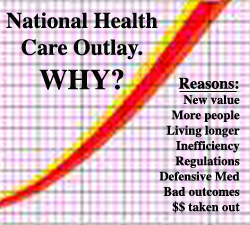
The government has a simple way to "cut costs" in health care: reduce reimbursements. They have been reducing costs this way for over forty years and yet the costs of health care have skyrocketed. Does this strike you as strange? Maybe reducing reimbursements does not cut costs!
Think about a budget as though you were a hospital or doctor. They have fixed costs for personnel, maintenance, equipment, amortization, etc. They have to pay these amounts every month and the payments keep going up. The hospital or doctor cannot control their expenditures. The demand for services is in the hands of the patients - the consumers who pay in aggregate but not as individuals. Meanwhile, the reimbursements keep going down. You do not need to be a brilliant economist [is that an oxymoron in today's financial crisis?] to see where that leads.
In the 1980s and 1990s, there was a hue and cry about hospitals' "cost shifting" where they would transfer a fixed but unreimbursed cost to a different cost center in order to try to break even. That worked under the old cost-plus (variable) system of compensation.
Today health care has fixed (regulated) reimbursements. To try to avoid bankruptcy, providers have been shifting revenue - using profit from one area to pay for mandated losses in another. However, when reimbursements are cut and there are no profits, revenue shifting cannot work. You can guess where this leads.
Bottom line: reducing reimbursements starves the system while the costs of healthcare continue to seek the stratosphere. In 1960, the USA spent 5.1% of GDP on healthcare and last year it was over 15%. Why are health care costs skyrocketing? Where is all that money going?
There are nine reasons for escalating health care costs.
1.New value (new medical capabilities) resulting in
2.More people who live longer.
3.Inefficiency
4.Regulatory compliance and unfunded mandates
5.Perverse incentives
6.Defensive medicine
7.Adverse outcomes and errors
8.Profits taken out of healthcare (insurance and medical malpractice)
9.Fraud and embezzlement
No percentages are given because the only information available are WAGs (wild-assed guesses). To state that more clearly, the true costs of anything in healthcare - hernia repair; HIPAA compliance; medical errors - are unknown. All of the nine cost categories are real, significant, but not precisely quantified.
What should be obvious but still must be stated is: we want the first two costs of health care - they are the value of our expenditures. To cut health care costs without cutting what we want, we must focus on reducing the other seven expenses.
Does cutting reimbursements reduce Inefficiency; Costs of regulatory compliance; Defensive medicine; Adverse outcomes and errors; or Fraud and embezzlement? No! Reducing reimbursements just makes hospitals go out of business and makes providers leave health care or decide not to go into the field in the first place.
(The irony of the word "reimbursement" is not lost on those in healthcare. Strictly, it means compensating someone for an expense. If that is true, why are they reducing the pay-back when the expenses are going up?!)
What about those obscene profits that drug companies make? When a pill we need every day costs $2, $10 or even $40 per pill, we think: it probably costs them 20 cents to make and they charge me $20 - that is obscene and unfair. And from that standpoint alone, we are right. But...
Pharmaceutical companies exist first to survive, which in business means making a profit. Any guess how much it costs to get a drug through the FDA approval process? Answer: over $1 billion and an average of 12-14 years. The consumer who looks at the bill for $20/pill has no knowledge of how much money the company spent developing that drug or other drugs that did not make it to or through approval. The consumer has no knowledge of the company's lost billions that had to be made up by profit on the drug the consumer is taking. 4) It may look like Merck or Pfizer is getting rich off of our illnesses but that is not the case. The successful pharmaceutical companies are making 12-17% profits [good but hardly obscene] and the others are going under.
The whole issue of profit motive and pharmaceuticals requires in depth exploration and will be considered in a future blog. Suffice it to say that obscene pharmaceutical profits play no role in our national upward spiral of healthcare costs, other than the costs we want: new value and living longer.
Question #1: Why are health care costs so high?
Answer: Nine reasons listed above.
Question #2: What should we do about high health care costs?
Answer 2A: Keep paying for the two reasons we want.
Answer 2B: Stop paying for the seven reasons we do not want.